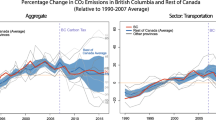Abstract
Pollution is a by-product of production, is only gradually dissolved by the environment, and crosses national borders. The market outcome ignores the adverse effects of pollution and thus yields higher levels of output and pollution than would prevail under a supranational social planner which does care about pollution. In practice, governments often do not cooperate and this leads to outcomes of pollution and production in between the market outcomes and the outcomes under supra-national social planning. Absence of precommitment leads to lower emission charges, less cleaning-up activities and more pollution. Appropriate levels of emission charges under the various outcomes are a result of this analysis. Attention is also paid to investment in clean technology. The debate between optimists, who believe that higher production is compatible with sound environmental policy, and pessimists can be analysed in this way.
Similar content being viewed by others
References
Başar, Tamer and Geert Jan, Olsder (1982), Dynamic Non-Cooperative Game Theory, Academic Press, New York.
Benhabib, Jess and Roy Radner (1989), ‘Joint Exploitation of a Productive Asset: A Game-Theoretic Approach’, mimeo, New York University.
Blanchard, Olivier Jean and StanleyFischer (1989), Lectures in Macroeconomics, MIT Press, Cambridge, MA.
Dasgupta, Partha (1982), The Control of Resources, Basil Blackwell, Oxford.
Dutta, Prajit K. and Rangarajan Sundaram (1989), ‘The Tragedy of the Commons? A Characterisation of Stationary Perfect Equilibria in Dynamic Games’, mimeo, Columbia University and University of Rochester.
Fershtman, Chaim and Morton I.Kamien (1987), ‘Dynamic Duopolistic Competition with Sticky Prices’, Econometrica 55(5), 1151–1164.
Fershtman, Chaim (1989), ‘Fixed Rules and Decision Rules: Time Consistency and Subgame Perfection’, Economics Letters 30(3), 185–191.
Folmer, Henk and Ekko C.vanIerland (1989), ‘Valuation Methods and Policy Making in Environmental Economics: Relevance and Scope’, in Folmer, Henk and Ekko C. van Ierland (eds.), Valuation Methods and Policy-Making in Environmental Economics, North Holland, Amsterdam.
Folmer, Henk and Charles W.Howe (1991), ‘Environmental Problems and Policy in the Single European Market’, Environmental and Resource Economics 1(1), 17–41.
Hoel, Michael (1990a), ‘Properties of International Environment Conventions Requiring Uniform Reductions of Emissions from all Participating Countries’, mimeo, University of Oslo.
Hoel, Michael (1990b), ‘Emission Taxes in a Dynamic Game of CO2 Emissions’, mimeo, University of Oslo.
Hoel, Michael (1991), ‘Global Environmental Problems: The Effects of Unilateral Actions Taken by One Country’, Journal of Environmental Economics and Management 20(1), 55–70.
Ierland, Ekko C. van (1990), ‘The Economics of Transboundary Air Pollution in Europe’, mimeo, Wageningen Agricultural University.
Keeler, Emmett, MichaelSpence, and RichardZeckhauser (1971), ‘The Optimal Control of Pollution’, Journal of Economic Theory 4, 19–34.
Krutilla, Kerry (1990), ‘Environmental Policy-Making in an International Context’, mimeo, Indiana University.
Mäler, Karl-Göran (1989a), ‘The Acid Rain Game’, in Folmer Henk and Ekko C. van Ierland (eds.), Valuation Methods and Policy-Making in Environmental Economics, North-Holland, Amsterdam, 231–252.
Mäler, Karl-Göran (1989b), ‘The Acid Rain Game 2’, presented to the workshop on Environmental Analysis and Environmental Toxicology, Noordwijkerhout.
Malinvaud, Edmond (1972), Lectures in Microeconomic Theory, North-Holland, Amsterdam.
Musu, Ignazio (1989), ‘Optimal Accumulation and Control of Environmental Quality’, mimeo, University of Venice.
Ploeg, Frederickvan der (1987), ‘Inefficiency of Credible Strategies in Oligopolistic Resource Markets with Uncertainty’, Journal of Economic Dynamics and Control 11, 123–145.
Ploeg, Frederickvan der and Aart J.deZeeuw (1990), ‘Perfect Equilibrium in a Model of Competitive Arms Accumulation’, International Economic Review 31(1), 131–146.
Ploeg, Frederickvan der and CeesWithagen (1991), ‘Pollution Control and the Ramsey Problem’, Environmental and Resource Economics 1, 97–118.
Reinganum, Jennifer and NancyStokey (1985), ‘Oligopoly Extraction of a Common Property Resource: The Importance of the Period of Commitment in Dynamic Games’, International Economic Review 26, 161–173.
Reynolds, Stanley S. (1987), ‘Capacity Investment, Preemption and Commitment in an Infinite Horizon Model’, International Economic Review 28, 69–88.
Siebert, H. (1987), Economics of the Environment, Springer-Verlag.
Smith, V. L. (1968), ‘Economics of Production from Natural Resources’, American Economic Review 58(3), 409–431.
Tahvonen, Olli and Jari Kuluuvainen (1990), ‘Renewable Resources, Economic Growth and Pollution’, mimeo, Helsinki School of Economics.
Author information
Authors and Affiliations
Rights and permissions
About this article
Cite this article
van der Ploeg, F., de Zeeuw, A.J. International aspects of pollution control. Environmental and Resource Economics 2, 117–139 (1992). https://doi.org/10.1007/BF00338239
Issue Date:
DOI: https://doi.org/10.1007/BF00338239




